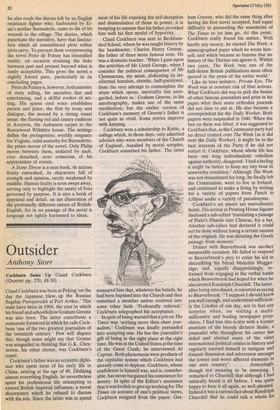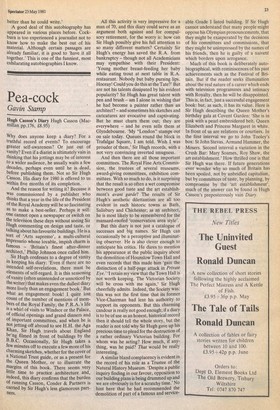Outsider
Anthony Storr
Cockburn Sums Up Claud Cockburn (Quartet pp. 270, £8.50) Claud Cockburn was born at Peking 'on the day the Japanese blew,. up the Russian flagship Petropavolsk at Port Arthur.' This must have been in 1904, the year in which his friend and schoolfellow Graham Greene was also born. The latter contributes a minuscule foreword in which he calls Cockburn 'one of the two greatest journalists of the twentieth century.' Few will dispute this; though some might say that Greene was misguided in thinking that G.K. Chesterton, his other choice, was Cockburn's equal.
Cockburn's father was an eccentric diplomat who spent most of his early life in China, retiring at the age of 49. Disliking almost everything English, he nevertheless spent his professional life attempting to extend British Imperial influence; a moral discrepancy which he refused to discuss with his son. Since the latter was to spend most of his life exposing the self-deception and dissimulation of those in power, it is tempting to assume that his father provided him with his first model of hypocrisy, Claud Cockburn was sent to Berkhamsted School, where he was taught history by the headmaster, Charles Henry Greene, the father of three more famous sons. He was a dramatic teacher. 'When I gaze upon the activities of Mr Lloyd George, when I consider the political consequence of Mr Clemenceau, my mind, abdicating its intellectual function, shrinks, halt-paralysed, from the very attempt to contemplate the abyss which opens, inevitably but unregarded, before us.' Graham Greene, in his autobiography, makes use of the same recollection; but the earlier version of Cockburn's memory of Greene's father is not quite so vivid. Some stories improve with keeping.
Cockburn won a scholarship to Keble, a college which, in those days, only admitted scholars who were members of the Church of England. Assailed by, moral scruples, Cockburn consulted his father. The latter reassured him that, whatever his beliefs, he had been baptised into the Church and thus remained a member unless received into some other faith. 'Profoundly relieved,' Cockburn telegraphed his acceptance.
In spite of being warned that a job on The Times was 'nothing more than sheer journalism,' Cockburn was finally persuaded into accepting one. He has the journalist's gift of being in the right place at the right time. He was in the United States at the time of the Great Crash; he interviewed Al Capone. Both phenomena were products of the capitalist system which Cockburn had already come to deplore. Cockburn, whose confidence in himself was, and is, considerable, has never bargained his conscience for money. In spite of the Editor's assurance that it was foolish to give up working for The Times on account of one's political views, Cockburn resigned from the paper. Gra ham Greene, who did the same thing after having his first novel accepted, had equal difficulty in persuading the mandarins of The Times to let him go. At this point, Cockburn really found his metier. With hardly any money, he started The Week, a mimeographed paper which he wrote himself, and which became so famous that no history of the Thirties can ignore it. Within two years, The Week 'was one of the half-dozen British publications most often quoted in the press of the entire world.'
Like its later imitator, Private Eye, The Week was at constant risk of libel actions. What Cockburn did was to pick the brains of other famous journalists and print in his paper what their more orthodox journals did not dare to put in. He also became a correspondent for the Daily Worker. Both papers were suspended in 1940. When the ban on them was lifted, it was suggested to Cockburn that, as the Communist party had no direct control over The Week (as it did over the Daily Worker), it might be in the best interests of the Party if he did not restart it. Cockburn, whose whole life has been one long individualistic rebellion against authority, disagreed. 'I had a feeling it might be better to keep my tiny boat in seaworthy condition.' Although The Week was not resuscitated for long, he finally left the Communists, went to live in Ireland, and continued to make a living by writing for a variety of papers from Punch to Lilliput under a variety of pseudonyms.
Cockburn's set pieces are marvelously funny. His arrival at Printing House Square disclosed a sub-editor 'translating a passage of Plato's Phaedo into Chinese, for a bet. Another sub-editor had declared it could not be done without losing a certain nuance of the original. He was dictating the Greek passage from memory.'
Dinner with Beaverbrook was another memorable occasion. He failed to respond to Beaverbrook's ploy to enlist his aid in discrediting his friend Malcolm Muggeridge; and, equally disappointingly, refrained from engaging in the verbal battle which Beaverbrook had hoped for when he also invited Randolph Churchill. The latter, after being introduced, is reported as saying to Beaverbrook: 'I suppose I should know you well enough, and understand sufficiently the London of our day, not to feel any surprise when, on visiting a multimillionaire and leading newspaper proprietor, I find him tete-a-tete with a former associate of the bloody dictator Stalin, a journalist who throughout his career has aided and abetted many of the vilest international political crimes in history and regularly exerted himself to instigate and foment dissension and subversion amongst the lowest and worst affected elements in our own country". . . . AnnoyinglY, though not meaning to be annoying, I remarked to Churchill that although I had naturally heard it all before, I was quite happy to hear it all agaAi, so well-phrased. Indeed it was a curious fact about Randolph Churchill that he could talk a whole lot better than he could write.'
A good deal of this autobiography has appeared in various places before. Cockburn is too experienced a journalist not to know how to make the best out of his material. Although certain passages are already familiar, it is good to 'have it all together.' This is one of the funniest, most exhilarating autobiographies I know.











































 Previous page
Previous page